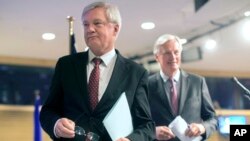The European Union's chief Brexit negotiator warned Thursday that talks on Britain's departure from the bloc are weeks, possibly months, away from making substantial progress, despite hailing a positive new momentum in the negotiations.
Britain is scheduled to leave the EU on March 29, 2019 - the first member country ever to do so - but the talks must be wrapped up by October 2018 to allow time for parliaments to ratify it.
More than a year since Britons voted to go, and six months after London's Brexit announcement, the talks are still in a preliminary phase. Many EU leaders fear that time will run out, leaving a messy divorce that would be damaging to both Britain and its European partners.
After a fourth round of negotiations concluded in Brussels, Michel Barnier said: “We will need several weeks, even several months, to be able to see 'sufficient progress' on the principles of this orderly departure.”
Britain's Brexit negotiator David Davis was more upbeat, and told reporters that the negotiations are moving forward.
“This round was a vital one. We made important progress,” he said.
EU leaders insist the talks must make “sufficient progress” on Britain's financial settlement, the rights of citizens hit by Brexit and the status of the Ireland-Northern Ireland border before they can be broadened. Britain says future relations and trade are intertwined with the divorce settlement and that all parts should be thrashed out together.
The leaders, minus British Prime Minister Theresa May, must rule on whether and when “sufficient progress” has been made. They had been expected to do just that on October 19-20 at their next summit, but Barnier's assessment assures that this tentative deadline will be missed.
Barnier said Britain has not yet identified the amount of the financial commitments it will make as part of the divorce agreement, although it has agreed to pay its 2019 and 2020 budget share, part of the EU's long-term budget arrangement from 2014-2020, debated and agreed on around five years ago.
“The only way to reach sufficient progress is that all commitments undertaken at 28 (member states) are honored at 28,” the former French government minister said.
Barnier and Davis acknowledged that they had failed to bridge differences over what role the European Court of Justice should play in the future. One of the main Brexit referendum campaign themes played on public discontent with the Luxembourg-based ECJ ruling on British interests.
“This is a stumbling block for the EU,” said Barnier.
Still, he hailed the “new dynamic” that May's speech in Italy last week had inspired and the more detailed British proposals that had resulted from it.
Davis agreed that things had changed.
“We are making decisive steps forward,” Davis said, adding that much progress was made on ensuring the rights of citizens who will be hit by Britain's departure. Those include some four million people in all - EU citizens living in Britain and Britons living on the continent.
“Britain wants to be the European Union's strongest friend and partner,” Davis said. “I leave Brussels optimistic about this future and I look forward to continuing the negotiations.”







